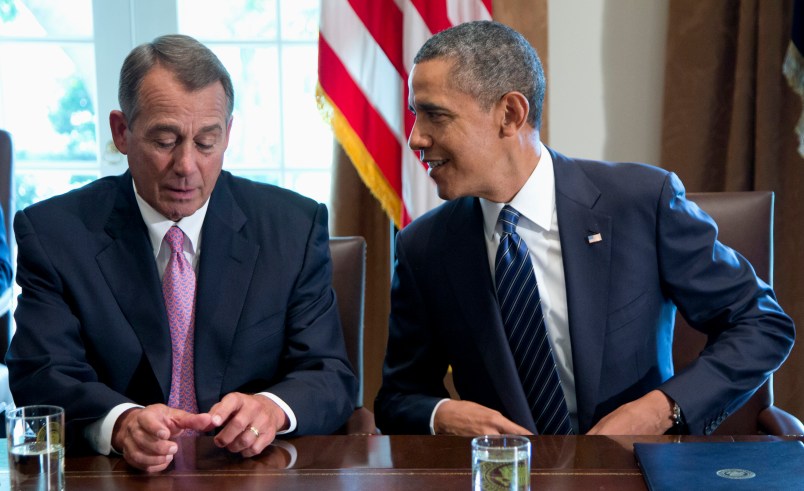House Republicans will vote on Thursday to repeal yet another piece of Obamacare: the provision that sets 30 hours as the threshold for defining full-time employees, raising it to 40 hours. A company’s compliance with the law’s employer mandate depends on its number of full-time employees, so fewer full-time workers would presumably lighten the mandate’s load on businesses.
If that seems like small potatoes for the party after its leaders continued to advocate for full repeal this week, here’s why: The Obama administration has outmaneuvered Republicans on Obamacare, and the opposition party doesn’t have many options left in its quest to roll back any part of the law. The administration already made unilateral alterations to unpopular pieces of the law, drawing bewildered reactions even from supporters.
But by making changes itself, the White House hasn’t let the GOP get in on the game, despite the party’s unending stream of anti-Obamacare bills — therefore denying Republicans the opportunity to extract the high-profile pound of flesh from the law that they’ve been seeking for years.
On its face, it’s tough to see the policy rationale for this latest attack on the law. House Majority Leader Eric Cantor explained the GOP’s thinking on the chamber floor Wednesday, arguing that Obamacare’s 30-hour rule had encouraged businesses to cut their workers’ hours and that raising the threshold would restore hours and therefore wages.
The Congressional Budget Office projected, however, that the proposal would lead to 500,000 more uninsured Americans and raise the federal deficit by nearly $74 billion over the next 10 years. The White House has already pledged to veto the bill if it somehow made it through the Senate and to President Barack Obama’s desk, but that’s besides the point.
The reason that Republicans are stuck going after a provision that, while unpopular with the business community, largely lives on the law’s periphery is this: The administration, through its own unilateral changes to Obamacare, has already picked the best meat off the bone.
Take the law’s two best-known mandates: the individual mandate, requiring Americans to purchase health coverage, and the employer mandate, requiring businesses with more than 50 employees to provide coverage.
House Republicans would certainly have loved to gut both of them, and Thursday’s bill is a roundabout way to undercut the employer mandate. A bill repealing it also earned 213 sponsors in 2011. The GOP has gone after the individual mandate any which way it can, up to a kamikaze mission last month that would have tied Medicare doctor payment cuts to an individual mandate repeal. It, like every other big-ticket repeal proposal before it, failed and Republicans relented in spectacular fashion by restoring the payment cuts without repeal on a voice vote.
Conservatives are desperate to put their stamp on Obamacare by rolling back some significant provision; a few victories thus far have been extremely minor considering the big fish they’ve been going after. But the problem is: Short of outright repealing these provisions, the White House has already undone them to some degree on its own.
After pushback from the business community, the administration delayed the employer mandate for a year last summer and then softened it even further last month. When the final regulations for the individual mandate came out in March, a blanket “hardship exemption” and its flimsy reporting requirements left some of the law’s most vocal supporters in the policy world flummoxed. It was possible to imagine that the mandate might not end up applying to anyone.
“The language is awfully open-ended,” Tim Jost, a health law professor at Washington & Lee University, told TPM at the time. “It is hard to imagine what they were thinking when they threw the door open this wide.”
From a policy perspective, it might be perplexing, but the politics seem clear: The White House knows the mandate is universally unpopular, and offering as many opportunities as possible to avoid it might take some of the edge off. But by making the change administratively, Republicans are unable to take any credit for providing relief from the mandate.
That way, as senior administration officials did with reporters Tuesday, the Obama administration can hold up the GOP as the party of “full repeal,” while Democrats can portray themselves as making reasonable (re: popular) fixes. Sure, Republicans might have signed off on some of these changes if they had the chance — but the White House denied them the opportunity.
The resulting resentment is easy to read in Republican statements on the White House’s administrative alterations — in House Speaker John Boehner’s reaction to the announcement of the broad “hardship exemption” to the individual mandate last month, for example.
“There is a real question whether the White House has just abandoned the individual mandate, the heart of Obamacare itself,” he said on March 13. “The House is going to vote to delay the individual mandate tax and give everyone the same extension that the White House has already given them — yet the White House opposes the bill.”
“Frankly, the American people deserve some explanation as to what the White House really is doing.”
The House bill did pass, but that was the end of it and House Republicans capitulated in the end with their much-derided voice vote. Another dead end in the quest to smite their Obamacare white whale.
And that’s why, as the White House continues to narrow the GOP’s options, they’re growing more and more desperate in their strategy or left scrounging for smaller victories as they will Thursday — all the while unlikely to win even those.






